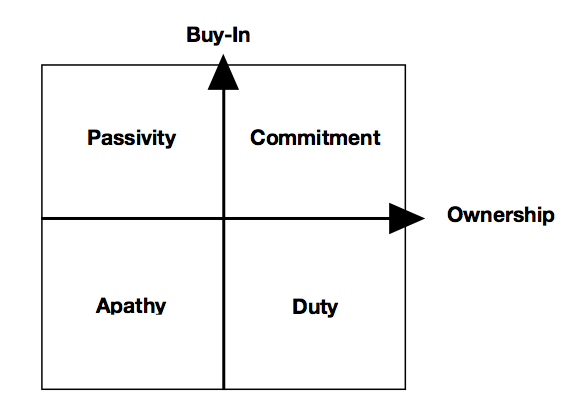[:en]New methods can appear threatening to some managers who have never had to change in order to be successful.
Too many CEOs want buy-in first before executing a change. Share on X
However, the most successful CEOs I know treat ownership of a change as the first priority and understand that buy-in will come later.
For example, the CEO of a European company in Japan knew that he had to reform sales strategy and methods if the company was to achieve growth objectives. That meant that salespeople could no longer simply rely on their network order-taking, but instead would have to learn to hunt for new business from new types of customers in new industries, selling to higher level buyers in a new way. The CEO insisted on waiting for buy-in from sales managers that would never come, at least not until the senior managers all retire, and even then it is not clear that those who succeed them will buy in.
Unlike buy-in, ownership allows for dissent because it is based on duty, not agreement with your rationale. Leaders first establish ownership and then entrust to others. Ownership is built on empowerment. By empowerment, I mean the ability to effect a business outcome as the result of one’s work. Empowerment requires the authority to make decisions and the resources needed to achieve the desired business outcomes.
For example, a vice president of sales was asked by her CEO to reform sales methods, to maintain sales results but to reduce rates of returned product, which were excessive. The CEO had engaged me to help her with reform. The vice president not only did not buy into the initiative but she vehemently opposed it. She felt it was not possible, as customers were enticed to buy with the understanding they could return unsold inventory. She insisted on reducing sales targets and resisted any discussion of reforming methods.
Rather than beseeching the vice president’s buy-in, the CEO accepted her right to disagree with the rationale of his decision but insisted that in her position she is responsible for implementing strategy as he decides. Establishing the vice president’s ownership while respecting her right to dissent worked. The vice president did not buy in at all, but that did not stop her from putting in a real effort to effect reform. Her sense of duty and professionalism were stronger than her aversion to the proposed change.
Buy-In Without Ownership
Buy-in is always nice to have, and buy-in and ownership are ideal in combination. However, it is only ownership that is needed for forward movement, not buy-in. In fact, buy-in without ownership achieves no progress toward change at all.
For example, the R&D organization in a client company of mine had a documented strategy for new product development and innovation. Everyone understood and agreed with the strategy. There was universal buy-in. However, year after year, there were no new innovative products, and only a handful of development projects, most of which were hopelessly stalled.
Sales and manufacturing teams use the R&D team for urgent support, and when a customer has a special request. Whenever there’s a quality control emergency at the factory, the R&D team is sent in like a crack commando team. The R&D team is on constant call, and the calls are frequent and always urgent. The R&D team has no ownership over its stated mission. Despite buy-in, the team remains passive toward the mission. Buy-in alone is not enough.
Buy-In Versus Ownership
Those who have high ownership and high buy-in of any change, initiative, or strategy will be committed, and that is the ideal. However, those who have high ownership but low buy-in will be dutiful, if also empowered and held accountable, like the vice president of sales who did not buy into the change, but acted on it anyway. While many leaders fear widespread resistance, passive or otherwise, without buy-in, in most cases professionals understand the need to do their jobs even when they don’t agree. They may not have the same fervor as those who buy in, but most will still be engaged nonetheless and act and make progress.
High buy-in and low ownership, however, results in passivity. People will agree with the direction you want to take the business and even accept it. However, they will have little impetus to translate that into their work if they feel little ownership and have not been empowered to the degree needed, like the R&D organization mentioned above. Low buy-in and low ownership results only in apathy. When ownership is low, even if you hold people accountable for results as a kind of threat, without empowerment to impact results there is little point in changing the way they do things whether they buy in or not.
Leaders Create Buy-In through Ownership
In the case of the vice president of sales above, her aversion to the change did not persist for very long. As reform began to work, the vice president’s skepticism faded, and she quickly became ardent about pushing forward with reform and trying new methods. There is nothing more persuasive than success. Within two months, her buy-in was even stronger than her resistance had been. Yet had the CEO waited for buy-in, he could have been waiting for years.
Ownership Trumps Buy-In
I never argue that buy-in does not matter, only that it matters less than what some people think. Always try to get as much buy-in as you can, but do not delay your plans because of insufficient buy-in. The key to progress is establishing ownership, not buy-in. Which is your priority?
 [:ja]マネージャーによっては、新しいやり方を取り入れることに不安を感じる人もいるようです。成功するための変革を経験したことのないマネージャーには特にその傾向があります。
[:ja]マネージャーによっては、新しいやり方を取り入れることに不安を感じる人もいるようです。成功するための変革を経験したことのないマネージャーには特にその傾向があります。
しかしながら、私の知っている中でも本当にできる 代表取締役 の方々は、変革の実行を第一に考え、周りからの理解はいずれ得られるという見方をしています。
例を挙げましょう。あるヨーロッパベースの会社の日本のCEOは営業戦略とやり方を革新しなければ、自社の掲げる成長目標を達成することができないとわかっていました。その革新とは、営業部のスタッフがそれまでやってきたネットワークからの受注だけに頼ることをやめ、新しい業界の新規顧客からのビジネスを獲得し、新しいやり方でレベルの高い顧客への販売を行う方法を学ぶということを意味していました。このCEOは、この革新を実行する前に、まず営業マネージャーからの同意を得る事に固執したのですが、そのような同意が最初から、或いは少なくともシニアマネージャーが全員引退するまでは得られる訳はありませんし、もしシニアマネージャーが引退したとしても、その後継者から同意を得られるかどうかもわかりません。
賛成を得る場合と異なり、責任を所有するというアプローチの場合は、自分の理由づけに同意してくれるかどうかではなく義務に基づいたものなので、反対意見に耳を傾けることもできます。リーダーはまず責任を所有するということを明確にしてから、周りの人々にいろいろ任せるのです。責任の所有は、権限を持たせるということに基づいています。ここで私が言う権限とは、自分の仕事の成果により、ビジネスの結果に影響を与えるということです。権限を持たせるには、決定権や、望んでいるビジネス結果を達成するために必要なリソースを与えなければなりません。
ある営業担当の副社長は、CEOから、営業のやり方を変えることで、営業成績を維持しながらそれまでかなり高かった返品の割合を減らすようにとの指示を受けたのですが、このCEOは副社長を助けてほしいと私に依頼して下さいました。この副社長は、CEOからの命令に賛成していなかったばかりか、実は大反対していたのです。彼女は、小売業の顧客は売れなかった商品は返品できると考えているからこそ喜んで自社の商品を買ってくれているのだから、返品を減らすことなど無理だと感じていたのです。代わりに彼女は営業ゴールを下げることを求め、営業方法の変革に関しては話し合おうともしませんでした。
この副社長に改革に賛成することを懇願する代わりに、CEOは彼女が反対しているということは受け容れながらも、自分が決定した戦略を実行することは営業担当副社長としての彼女の責任であると固執しました。彼女の反対意見を認める一方で、変革実行の為の責任を彼女に与えるというこのやり方は成功しました。彼女は相変わらず反対し続けていましたが、それでも改革を行うために多大な努力をしてくれたのです。彼女の責任感とプロフェッショナルな態度は、変革への反対感を上回ったという訳です。
責任を伴わない同意
変革実行において前以て同意を得られればそれに越したことはありませんし、同意と責任の所有の両方が存在するのはもちろん望ましいシチュエーションです。しかし改革を進めるに当たって必要なものは責任の所有の方で、同意ではありません。実際、責任所有なしに同意だけ得ても、変革に向かっての進展は全然起こりません。
ある私のクライアントの企業は研究開発を行っているのですが、新製品の開発、イノベーションのための戦略を文書化してありました。そして誰もがその戦略を理解し、またそれに同意していました。会社全体で同意をしていたのです。しかし毎年も新しい画期的な商品が生み出されることはなく、わずかに残っていた開発プロジェクトもその殆どに進展は見られませんでした。
営業と製造チームは緊急な助けが必要になったり、顧客から例外的なリクエストを受けると、いつも研究開発部に頼っています。工場で品質管理に関する緊急事態が発生すると、あたかも特別部隊かのように召集されるのも研究開発部です。こうして研究開発部はしばしば多方面から引っ張られており、その理由は常に緊急な内容です。つまり研究開発部はそのミッションに対する責任を所有できていないのです。チームがみんなそのミッションに同意しているにも関わらず、受動的なままでいるのです。同意だけでは十分でない、ということがお分りいただけますでしょうか。

同意を得ること vs. 責任を所有すること
変革やイニシアチブ、戦略を導入する際に、責任の所有度も同意度も高い人々は、それに対する努力も惜しみません。しかし、責任の所有度は高いけれども同意はあまりしてもらえていない、という人々も、責任をしっかり与えられれば、忠実に行動を起こしてくれます。先程の変革には反対だったけれどもそれでも協力してくれた副社長がその良い例でしょう。多くのリーダーは同意を得られなければ、大規模な抵抗を起こされるのではないかと恐れていますが、殆どの場合、プロであれば自分が賛成できないことでも、仕事としてこなす必要があると理解しています。同意しなかった人々は他のスタッフほど熱心ではなくとも、そのほとんどは参加し、変革を進めるために行動してくれます。
しかし、同意は多く得られたけれども責任の所有はしっかり行われていない、という場合は、受動的な結果を生み出してしまいます。人々はあなたが目指すビジネスの方向に賛成し、それを受け容れてくれるかもしれません。しかしながら、もし彼らが責任を対して与えられていないとか、必要なだけの権利を与えられていないと感じれば、その改革を仕事の中で実行するための気持ちが十分持てなくなります。上記の研究開発部のように。同意度の低さと責任所有度の低さは、単にやる気のなさを生み出します。責任所有度が低ければ、いくら結果を出すようにプレッシャーをかけたとしても、結果を出すための権利を与えることなしには、同意の有る無しに関わらず、変革を行う意味は大してないのです。
リーダーは、権利を与えることで同意を生み出す
上記の副社長の場合は、変革に対する抵抗は長く続きませんでした。変革がうまく作動するにつれ、彼女の懐疑心もほぐれ、間も無く改革の推進と新しいやり方に熱心に取り組むようになりました。成功ほど説得力のあるものはありません。ほんの2ヶ月以内に彼女の同意度はそれまでの抵抗度よりずっと強いものになったのです。もしCEOが彼女の同意を得られるまで改革に手をつけなかったとしたら、何年も待つ羽目になっていたでしょう。
責任所有は同意よりずっと重要である
私は同意など必要ないと言っているわけではありません。人々が思っているほど必要というわけではない、と言いたいのです。どんな場合でもできるだけ多くの同意を得、しかしいくら同意してくれる人が十分でないからという理由でプランを先延ばしにしてはいけません。先に進むための鍵は、責任の所有をしっかりさせることであり、同意を得ることではありません。あなたはどちらを大切にしていますか。


